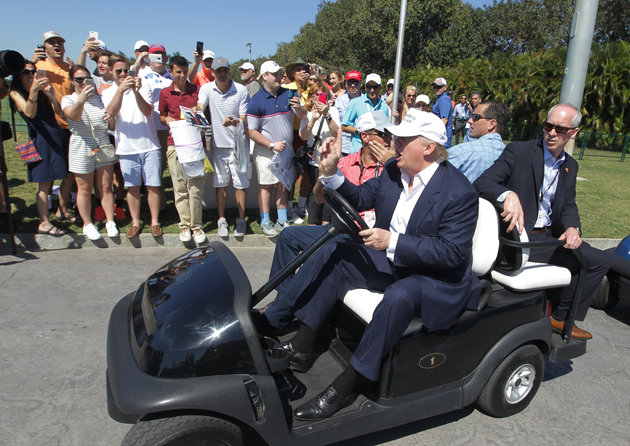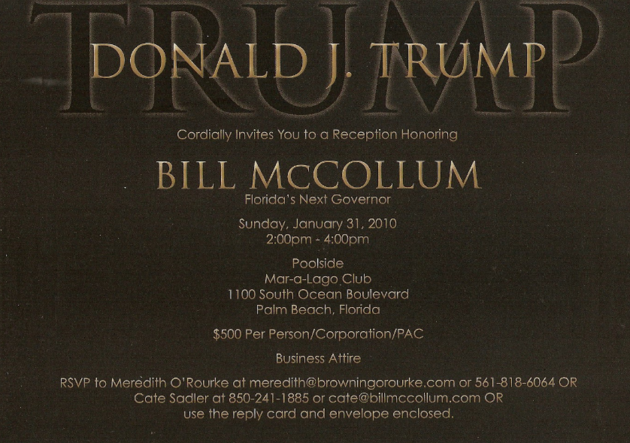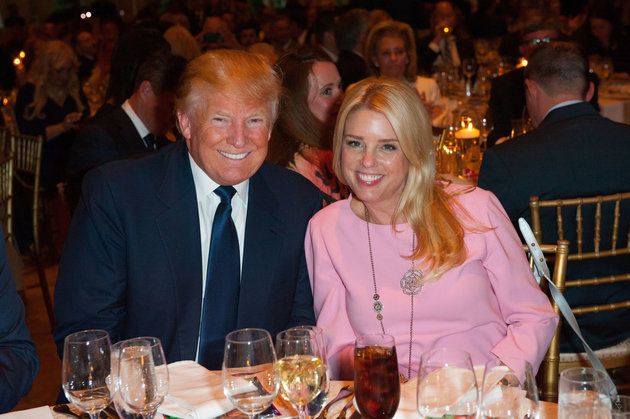
Republican presidential nominee Donald Trump drives himself around the golf course in Doral, Florida, on March 6, 2016.
Years before he cozied up to Florida Attorney General Pam Bondi, Donald Trump attempted to make similar inroads into the state’s top law enforcement office.
On Oct. 3, 2006, the real estate mogul cut a $500 check to Walter “Skip” Campbell, the Democrat running for attorney general, according to campaign finance reports. Twenty-five days later, he reversed course, writing a $500 check to Campbell’s Republican opponent, Bill McCollum. As the election neared and McCollum’s prospects brightened, Trump gave a $1,000 check to the pro-McCollum group Citizens Speaking Out Committee, Inc.
Three years later, when McCollum was making a run for governor, Trump was once again there to help. In January 2010, he held a $500-per-head fundraiser for McCollum’s gubernatorial campaign at his posh resort, Mar-a-Lago.

A fundraiser that Donald Trump hosted for Bill McCollum in 2010.
The money that Trump gave McCollum was dwarfed by the $25,000 his foundation contributed to Bondi before she opted not to join a lawsuit against Trump University. But it still illustrates a side of Trump that has complicated his run for the presidency. His contention that Democratic nominee Hillary Clinton engages in pay-to-play politics has been undermined by his own history of deploying his vast financial resources and celebrity to influence politicians. This was especially true in Florida.
“I would consider Trump to be a fairly significant player in politics,” said Ron Book, a longtime Florida lobbyist. “Any notion that Trump didn’t directly communicate with a broad array of Florida political figures over the last decade would just be misleading the public.”
By the time Trump hosted McCollum at Mar-a-Lago, his university and a seminar program to which he’d lent his name ― The Trump Institute ― were earning reputations as fraudulent enterprises. And numerous complainants were asking the attorney general’s office, which McCollum headed, to help them recuperate money.
McCollum told The Huffington Post that he was personally unaware of the complaints, saying the cases were likely handled by consumer protection officials. But the issue wasn’t exactly hidden from public view. In May 2010, the New York Daily News reported that McCollum’s office was looking into the complaints. His office ultimately never took legal action, passing the matter along to Bondi.
McCollum said he never talked to Trump about the seminars, nor did Trump ever press him for legislative or business favors at Mar-a-Lago or when the two met separately at Trump Tower in New York. The meetings, instead, were geared toward building a fairly common type of political relationship: McCollum wanted financial support and Trump, he imagined, wanted access.
“I was aware of the fact that he was a businessman and prominent,” McCollum said, noting that he had to run against a wealthy self-funder in current Florida Gov. Rick Scott (R). “It didn’t make him a special target for me. But it would show me as a candidate that he had the means to contribute and was known to make contributions. So I hoped he would contribute to me.”
“I’m not surprised that he contributed to both sides, to [Walter] ‘Skip’ [Campbell] and me both in that ‘06 race,” McCollum went on. “A lot of people do that. Especially businesspeople who didn’t have a particular passion for one political party or another. They were hoping to get an audience.”

Donald Trump and Florida Attorney General Pam Bondi attend the Palm Beach Lincoln Day Dinner at Mar-a-Lago, Palm Beach, Florida.
As his business empire expanded through Florida, Trump pursued an audience and favors in many venues. In addition to backing multiple attorneys general, he donated to state senators, governors (Jeb!), lieutenant governors, and House members. He used affiliated companies to skirt donation limits. And his contributions occasionally followed Florida politicians outside the state. When Bondi took over as chair of the Republican Attorneys General Association in 2014, for example, Trump made a $5,000 donation to the group.
Trump often operated at the intersection of business and government. Starting in 2013, he began employing a high-powered lobbyist in the state. And around that same time, he turned Mar-a-Lago into a fundraising base, hosting events for Republicans in its ballrooms year after year. By 2016, he was bragging about how much money he’d brought in for local party hacks.


